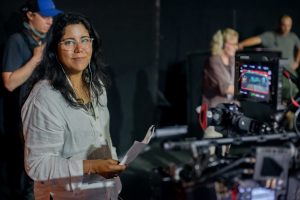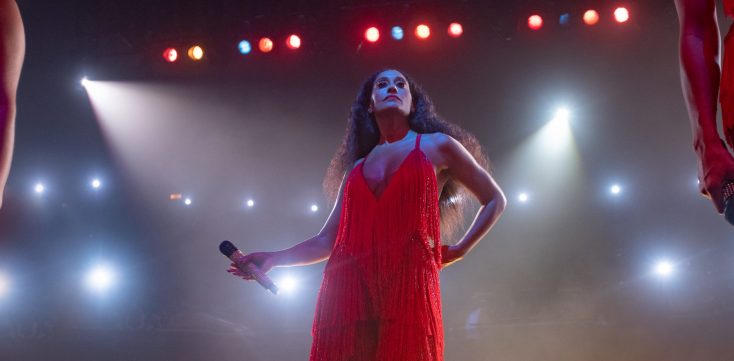
Director Nisha Ganatra on the set of her film THE HIGH NOTE. ©Focus Features. CR: Glen Wilson / Focus Features
By ANGELA DAWSON
Front Row Features
HOLLYWOOD—It only took 47 years for the world to hear what the offspring of singing legend Diana Ross and high-powered music executive Robert Ellis Silberstein would sound like. On May 29, audiences will be able to hear Tracee Ellis Ross, an established actress in her own right, reveal her singing chops as she plays a (fictional) pop singer in “The High Note,” a music-filled dramedy about following your dream and taking risks.
The film is directed by Canadian filmmaker Nisha Ganatra, who cast Ross in the film as the uncompromising singer even before she heard her perform a single note. She simply had faith that Ross had the acting chops, as well as the first-hand knowledge of growing up in talented music family, that she could do it.
Ross, best known for her roles on the TV comedies “black-ish” and “mixed-ish,” delighted the filmmaker with her remarkable voice, once they got into the studio to record, prior to the film going into production.
She plays Grace Davis, a music icon who is struggling to survive in an industry that sidelines women when they reach the age of 40. She co-stars opposite Dakota Johnson (“Fifty Shades of Grey” movies), who plays Grace’s longtime personal assistant, who has aspirations of being a music producer—an almost unheard of profession for women in Hollywood. The film is about the women’s respective struggles to achieve their dream and the risks they take—and ultimately the support they give each other—to accomplish their goals.
Though Ross grew up in the world of music, she did not base the character of Grace on her mother.
“Grace Davis is not in any way based on my mom,” she insists, “but I think she’s a woman that we all know. At the core of this role, the thing that was so interesting to me is this was a woman who, like many women, has had to put her true self aside to play the game and to find the success that she wants and deserves. I think this is that turning point for this woman, where she can either keep going down the road she’s been on or she can let her heart fly and let her passions be what they are and let her secrets actually be her gifts.”
Johnson, also a daughter of Hollywood elite (actors Don Johnson and Melanie Griffith), gets a chance to sing a bit in the film as her character, Maggie, falls in love with a budding young musician (played by Kelvin Harrison, Jr.), and encourages him to follow his dream of becoming a recording artist.
With the two female protagonists striving to achieve their dream in a “man’s world,” the film is similar in theme to Ganatra’s previous comedy “Late Night,” which starred Emma Thompson as a late-night talk show host and Mindy Kaling as her new staff writer, brought onboard to help bolster her sagging ratings.
“I love that both ‘The High Note’ and ‘Late Night,’ center women who are being told by society and their industries that they should play it safe and be thankful for what they have,” says Ganatra. “Both women end up taking big risks, and both women are incredibly rewarded for it. I love a story that supports women taking risks and succeeding in an arena that has previously only celebrated the success of men.”
Making a feature film set against the backdrop of the popular music scene added an extra challenge in finding the right sound. Songs had to be written and recorded for the film prior to the start of filming.
“We learned the hard way that we had to produce an album and then film the movie with the album’s songs in it,” Ganatra recalls. “Who knew we were going to be producing an album for the first time in our lives? Luckily, we had Linda Cohen, Rodney Jerkins, Mike Knobloch and Natalie Hayden who know a thing or two.”
With guidance from the executive team at Universal Music, the filmmakers hired Jerkins, also known as Darkchild, to oversee the entire soundtrack. He’d previously collaborated with artists including Beyoncé, Jennifer Lopez, Lady Gaga, Mary J. Blige, Janet Jackson and others. Grammy winner Corinne Bailey Rae wrote original songs for the film, as did 25-year-old up-and-comer Sarah Aarons, who contributed three original tracks. Linda Cohen, who had worked with Ganatra on “Late Night,” served as the film’s music supervisor.
On May 21, Ross, an Emmy-nominated and Golden Globe Award-winning actress, released the official music video to “Love Myself,” one of the catchy new songs co-written for the film by Aarons and Greg Kurstin.
Republic Records and Focus Features will release “The High Note: Original Motion Picture Soundtrack” Friday May 29, the same day as the film, which will be available at home on demand. Produced by Grammy winner Jerkins, the 15-song soundtrack features new recordings by cast members Ross and Kelvin Harrison, Jr.
Front Row Features: The song, “Love Myself,” is such an inspiring and memorable song.
Nisha Ganatra: Thanks. It’s one of my favorite songs in the movie.
FRF: Tell me about how you got Tracee Ellis Ross onboard. Was she onboard from the beginning or did it require some convincing since she’s never publicly sung before?
Ganatra: She will say that she was chasing this and tracking this. We really needed a great actress to bring this character alive because she needed to know the life of a music icon and bring a point of view to it. She brought a very nuanced portrayal. The story looks into the life of an isolated celebrity. She had never sung out loud in front of anyone, I guess because she’s Diana Ross’ daughter.
FRF: A little intimidating?
Ganatra: A tiny bit, yeah. Now I know she always wanted to sing but turned to acting because she didn’t want to be in the shadow of her mother. So, for her to take this on, and do this, is so brave. And I’m so happy that she was. It works out perfectly with the script.
FRF: There are some parallels between her character and Dakota Johnson’s character. They both are women at crossroads in their careers.
Ganatra: It is. They’re both part of an industry (the music business) that they both love and adore and want to be a part of. One is being told that she’s not wanted anymore because of her age and the other is trying to get into music producing and the door is not open to her. Ultimately, they come together to help each other and support each other and overcome their obstacles by working together. That’s the message that I want to put out there. As women, we can either be each other foes or each other allies. Their coming together to support each other is the type of movie I like to watch.
FRF: What was it like filming Tracee Ellis Ross in the recording studio?
Ganatra: The music element of the story added another layer to the filmmaking. I had to figure out what the music would be and have the actors record the music ahead of time. They had to have vocal lessons and record the music (before the film went into production). Just getting the licensing on some of the songs we have (in addition to the new original recordings), was another aspect of putting this together. So, it was like a crash course in finding the right sound for the film.
We were shooting in studios where Michael Jackson, Whitney Houston, Destiny’s Child and others had recorded. We had incredible songwriters like Corrine Bailey Rae and Sarah Aarons, and our music producer Rodney Jerkins, gave us wonderful material to work with. I was there in the studio with Rodney when Tracee sang for the first time. If she hadn’t been able to sing, we would have had our work cut out for us but when she began to sing, we were so relieved that we didn’t have to use music tricks to record her. She has such a beautiful voice. I told her, “I’m mad at you for keeping this voice from the world for as long as you did.” Because it was really a beautiful moment.
FRF: How did “Late Night,” which also stars two women (Emma Thompson and Mindy Kaling) of different generations coping with the demands of the entertainment industry, prepare you for “The High Note?”
Ganatra: Yeah, both have an established icon and a young person who wants to break in. They both have a similar dynamic of how it’s almost always a struggle—and not just for women—when you become famous, and you think it’s going to be easy and you can sit back and let it ride, but it continues to be hard work and you have to continue to strive to remain on top. It involves a lot of dedication and work. In both movies, these women have to take really big risks and the result is that they are rewarded for those risks. It sends of message to keep following your dreams and take risks. It’s hopeful.
FRF: As a filmmaker, what was the big risk you took that changed your career?
Ganatra: It’s when I decided I wanted to make my first feature film. I gave myself permission to say, “OK, I’m going to direct my first feature film.” No one was saying, “Oh, you should be directing a feature film.” I just did it. The other big risk was deciding to have a baby because no one say to you, “Oh, that will be great for your career.” We’re all trying to balance or home lives and our work lives and for those of us in a very male-dominated field (feature filmmaking), you have the extra pressure of having to pretend that you don’t have a family life that you have to balance. So, I’ve kind of liked the quarantine for bringing that truth forward. There’s no hiding it anymore. We’re all people who are trying to balance it all.





